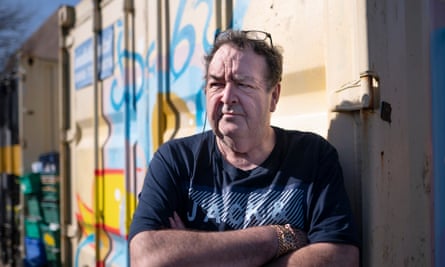
It started with Christmas. Sarah* was behind on rent and her money wouldn’t stretch, but she didn’t want her children to miss out. She turned to a local lender – “a friend of a friend” – and borrowed £700. She would repay £1,200 in total, broken down into £200-a-month chunks. The interest was steep but with a bad credit score and no relatives she could turn to, she didn’t have many options.
“I was desperate,” Sarah, 39, said. “Everything had piled up – rent, bills – and we were living hand to mouth. It was leading up to Christmas and I just knew I couldn’t do it.”
At first it went smoothly: the lender would come to her house and collect his £200 each month, scraped together from Sarah’s job in hospitality and universal credit. But when the third repayment was due, he turned. The lender was with two men she hadn’t met before and was demanding all the money. “I said, ‘I can’t pay that. We’ll have nothing left’,” she said. “But he said, ‘That’s not my fucking problem. Do you think I care?’ My heart was on the floor. I didn’t know what to do.”
The mother of four is one of thousands across the UK turning to loan sharks – illegal lenders who offer informal loans without paperwork, often at high interest rates. In some cases, they use threats and coercion to get their money back, sending harassing texts, taking bank cards to intercept benefit payments or visiting late at night to demand cash on the spot.
Events often turn violent. When Sarah said she couldn’t pay, she was attacked on her doorstep in front of her children. “He started getting aggressive,” she said. “I knew I couldn’t fight him; I had no chance. I ended up screaming, ‘OK, OK’.”
She managed to pay the debt – raised to £2,000 due to the “delays” – after handing over her universal credit, selling some possessions and going to the community centre for support.
 View image in fullscreenGerard Woodhouse, who runs L6 community centre in Everton, Liverpool. Photograph: Jon Super
View image in fullscreenGerard Woodhouse, who runs L6 community centre in Everton, Liverpool. Photograph: Jon Super
But, two months on, she is traumatised.
“Mentally, it has destroyed me,” she said. “The children are scared in their own home. I feel like a terrible mother for what I brought to my door.”
The true scale of illegal money lending is not known. While before the pandemic, 310,000 households were thought to be affected, many cases go unreported, according to Cath Williams of the Illegal Money Lending Team. But it is a growing national concern. In recent months, charities and community centres have seen a surge in people asking for help, some of whom turned to loan sharks to pay for school uniforms and food as well as rent and bills.
Last month, the Chartered Trading Standards Institute warned that the challenging economic environment had created a “perfect storm” for loan sharks and scammers. And data from Citizens Advice shows a surge in people needing support from food banks, with the charity making 25,441 referrals in January and February 2022 – up 26% on the year before. Referrals for grants for other essentials, such as clothes, are also up 46%, while requests for help with energy debt were up 33%.
Esther Iyobebe, a money mentor with the charity Money A+E, which runs community education programmes, said she had heard growing reports of loan sharks in London.
“It used to be Wonga. Now it’s an underground movement. They say, ‘Oh, I heard from a friend that you might need help,’” she said.
It’s not always cash. In one case, a woman bought a washing machine from an informal dealer on hire purchase and is now being harassed for repayments. “You pay three times over,” she said. “It’s entrapment.”
Gerard Woodhouse, chief executive of L6 Community Centre in Everton, said illegal lending was “rife” in Liverpool. “It’s worse here than drug dealing,” he said. “People aren’t borrowing money for drugs, except the odd one. People are borrowing money to survive. It’s electricity, gas, nappies, people needing school uniforms.”
UK ministers under pressure to ease impact of cost of living crisisRead more
The centre has supported 15 people in trouble with loan sharks since the start of the year, he said – compared with 12 for the whole of 2021.
Now Woodhouse fears that the rising costs of living – with surging food and fuel prices, energy bills and a national insurance increase coming into effect next month – mean things could be about to get much worse.
“People can contact the council for help, but you only get one bite of the cherry,” he said. “They can’t get standard loans and they’re getting bills in by the minute. God help us when April comes.”
* Name has been changed



